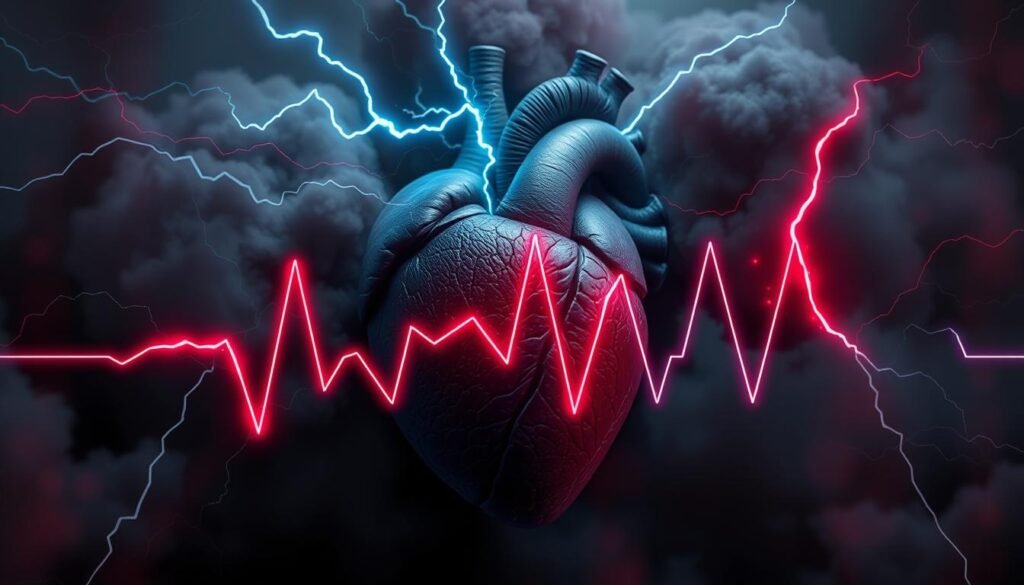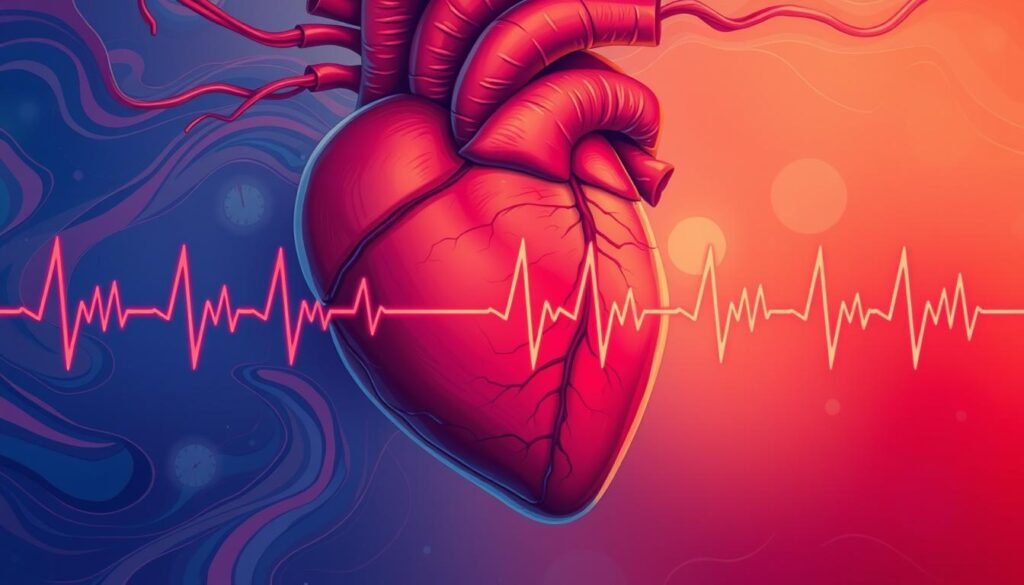Did you know anxiety is a top cause of heart palpitations not due to heart issues? This fact shows the big effect anxiety has on heart health. It touches nearly 1 in 5 adults in the United States at some time in their lives. When anxiety hits, the body starts its natural “fight or flight” mode. This leads to a higher heart rate and faster heartbeat, making worry and panic worse.
It’s key to understand how anxiety causes these physical effects to keep healthy. Without managing it right, chronic conditions can develop. That’s why it’s important for those dealing with anxiety-related heart problems to recognize symptoms and their health impacts.
Key Takeaways
- Anxiety is the primary cause of heart palpitations unrelated to heart disease.
- Close to 20% of the U.S. population will experience anxiety disorders at some point.
- Effective treatments include medication and psychotherapy.
- Heart palpitations triggered by anxiety are often temporary.
- Persisting symptoms may require immediate medical attention.
- Women are statistically more prone to various anxiety disorders than men.
- Regular exercise aids in managing anxiety and improving heart health.
The Connection Between Anxiety and Heart Rate
Anxiety can really affect your heart rate. It’s key to grasp this link to improve our health. Anxiety triggers a faster heart rate. This is known as anxiety tachycardia. When you feel scared, even without real danger, your body’s fight or flight response kicks in.
Understanding the “Fight or Flight” Response
The fight or flight response makes your body ready to face or run from threats. Anxiety causes the sympathetic nervous system to release norepinephrine, raising your heart rate and blood pressure. If you often feel anxious, you might notice your heart beats fast a lot. This can really affect how you feel physically.
The Role of Adrenaline in Anxiety
Adrenaline is super important in feeling anxious. It makes your heart beat super fast, sometimes adding up to 100 beats per minute. When this happens a lot, it can be a problem. People with a lot of anxiety might have low heart rate variability (HRV), showing their nervous systems are out of balance. Some might need medicine, like beta-blockers, to manage their heart rate. Learning about these triggers, practicing mindfulness, and having support can really help.
| Condition | Typical Heart Rate Change | Psycho-Physiological Effect |
|---|---|---|
| Anxiety | Increase of up to 100 bpm | Activation of fight or flight response |
| Chronic Anxiety | Persistent elevated heart rate | Lowered heart rate variability |
| AFib | Skipped or fluttering heartbeats | Potential fatigue or dizziness |
| Low HRV | Indicates chronic anxiety | Sympathetic dominance |
What are Heart Palpitations Related to Anxiety?
Heart palpitations are common for those with anxiety. They feel like your heart is pounding, fluttering, or racing. This usually happens when stress levels go up. When the stress goes away, so do the palpitations. Knowing this can help people not worry so much about their palpitations.
Identifying Symptoms of Heart Palpitations
It helps to know the signs of heart palpitations. Here are some common symptoms:
- Fast or irregular heartbeat
- Fluttering sensations in the chest
- Lightheadedness or dizziness
- Chest discomfort or pain
- Shortness of breath
These signs could also point to serious issues like atrial fibrillation (AFib). It’s important to see a doctor if you also feel dizzy or have chest pain. Anxiety-related heart races often come with strong emotions or panic attacks. They usually get better once the stressful moment passes.
How Anxiety Triggers Rapid Heartbeats
Anxiety can make your heart beat faster. This is because anxiety activates the autonomic nervous system (ANS). This leads to several changes in the body:
- Increased heart rate
- Heightened breathing rate
- Muscle tension
- Increased sweating
This makes the heart race, which can make anxiety worse. Relaxation methods like meditation, yoga, or deep breathing can help. They can reduce heart palpitations by calming the anxiety.

Anxiety Heart Rate: Impacts on Physical Health
Anxiety doesn’t just affect your mind; it also hits your physical health hard. It can make your heart rate go up for a long time. This can be bad news for your heart and can even lead to serious problems like heart disease.
Chronic Effects of Elevated Heart Rate
Anxiety can cause something called anxiety tachycardia. This means your heart beats faster than normal a lot. It can mess with how well your heart works. People with anxiety often have worse heart health than those who don’t, studies show.
Connection to Heart Disease and Cardiac Conditions
Anxiety and heart disease are more connected than we thought. Anxiety can make your blood pressure go up. This can set the stage for serious heart troubles. Research shows that people with certain anxiety disorders are more likely to have heart problems. If you already have heart issues, anxiety can make them even worse.

Common Types of Anxiety Disorders
Anxiety disorders cover many conditions that impact a person’s life, heart rate, and well-being. It’s crucial to know the various types for better handling and care.
Panic Disorder and Its Physical Symptoms
Panic disorder leads to sudden, fear-filled panic attacks and symptoms like a fast heartbeat, chest pain, and difficulty breathing. About 2% to 3% of U.S. adults face this yearly. Those with panic disorder often try to avoid places or situations that trigger these feelings, affecting how they live.
Understanding Generalized Anxiety Disorder
Generalized anxiety disorder (GAD) means having ongoing worries about many parts of life such as health, work, and personal relationships. It strikes around 2.9% of adults each year. Constant anxiety can cause long-lasting issues including an increased heart rate, tiredness, and trouble sleeping. GAD usually exists alongside other anxiety disorders, highlighting the need for recognizing and dealing with its symptoms.
Post-Traumatic Stress Disorder’s Effect on the Heart
PTSD occurs after traumatic events and can cause serious anxiety and faster heart rates. It’s marked by flashbacks and nightmares about the trauma, affecting those who’ve faced violence, fought in wars, or survived natural disasters. Studies show PTSD can provoke body reactions similar to other anxiety disorders, making heart health monitoring vital for those suffering.
Recognizing When Anxiety Affects Your Heart Rate
It’s important to know how anxiety can change your heart rate. Knowing the signs can help tell anxiety apart from other serious health issues. Many people feel their heart racing or fluttering when anxious. These feelings come from the body’s stress reaction. But if these symptoms happen a lot, you might need a doctor’s help to avoid worse problems.
Signs of Elevated Heart Rate Anxiety
When anxiety hits, your heart may beat faster. You might notice:
- Palpitations or a pounding feeling in the chest.
- Rapid heartbeat that feels out of place.
- Shortness of breath or difficulty breathing.
- Dizziness or lightheadedness.
- Chest pain or discomfort.
Knowing these signs can help you recognize and manage anxiety. Looking at resources on heart palpitations and anxiety can give you coping tips.
Distinguishing Between Panic Attack and Heart Attack Symptoms
Knowing the difference between panic and heart attack symptoms is vital. Both may involve chest pain, but there are key differences. Panic attacks appear quickly and might make you feel extreme fear. Heart attack signs can include:
- Severe chest pain or pressure.
- Pain that spreads to arms, back, neck, or jaw.
- Intense sweating or cold chills.
- Nausea or vomiting.
Always take sudden chest pain seriously and get medical help to check for heart attacks. Using guidelines on when to seek help can guide those unsure of their symptoms. Knowing these differences can save lives.

Addressing Increased Heart Rate Due to Anxiety
Dealing with a faster heart rate from anxiety takes effort. Both mental and physical methods help a lot. Cognitive behavioral therapy, or CBT, is a key way to change thinking. This helps lower anxiety and the faster heart rate that comes with it.
Inner Workings of Cognitive Behavioral Therapy (CBT)
CBT teaches people how to deal with anxiety better. It helps change harmful thoughts that make anxiety worse. This often makes heart racing slow down. In therapy, learning what triggers anxiety helps manage it. This can lead to a calmer heart rate.
Medication Options for Managing Anxiety
Some might need medication for anxiety along with therapy. Beta-blockers are common for slowing down the heart. These drugs help with anxiety’s physical effects. Talking to doctors is key to find the best treatment.
Using CBT and meds together can really help with anxiety’s fast heart rate. It’s a full approach for deep relief and better health. For more tips on dealing with anxiety and heart issues, check Verywell Health.
Managing Racing Heart Anxiety in Daily Life
Experiencing a racing heart due to anxiety is tough. Yet, using certain strategies daily can help lessen symptoms. It’s crucial to find a balance in activities that lower anxiety for better health.
Importance of Regular Exercise for Anxiety Relief
Regular exercise is key in fighting racing heart anxiety. It boosts mood by releasing endorphins and lowers stress levels. Research shows exercising can cut down anxiety disorder risks by up to 60%.
Simple activities like walking or aerobics can significantly make you feel better. They help control your emotional well-being and heart rate.
Mindfulness Techniques and Breathing Exercises
Mindfulness and controlled breathing are great for managing anxiety and slowing heart rates. Yoga and meditation help connect your mind and body, making you feel more at peace. They reduce symptoms of racing heart anxiety.
Quick deep-breathing exercises can calm you in stressful situations. They help shift your focus from anxiety symptoms instantly.
Long-term Effects of Anxiety on Heart Health
Understanding how anxiety impacts cardiovascular health is crucial. Long-term anxiety can raise blood pressure, leading to heart-related problems. Research shows that people with anxiety face cardiovascular risks earlier than others. This can lead to serious conditions, like coronary artery disease.
The Relationship Between Anxiety and Blood Pressure
Anxiety can consistently increase blood pressure levels. This may cause long-term harm to the heart. In a study, 38% of people developed a new cardiovascular risk, like high blood pressure, within ten years. Those with anxiety showed symptoms six months sooner than those without. Anxiety and blood pressure together can speed up heart issues by about 35%.
Stress Management for Better Heart Rate Variability
Good stress management is key for better heart rate variability (HRV). Using relaxation techniques and being active can help. Studies link stress scores with higher risk of heart disease. Healthy lifestyle changes can improve heart health. This shows that tackling anxiety helps both the nervous and cardiovascular systems.
| Factor | Impact |
|---|---|
| High Blood Pressure | Increases risk of heart disease and stroke |
| Anxiety Disorders | Elevated risk of cardiovascular events by approximately 35% |
| Stress Management | Improves heart rate variability and overall heart function |
| Cumulative Stress Score | Associated with higher cardiovascular risk factors |
For better heart health, it’s important to manage stress, live healthily, and notice anxiety symptoms. For more information on anxiety and heart health, click here.
Conclusion
Understanding the link between anxiety and heart rate is key to seeing how anxiety impacts health. Around 40 million Americans battle anxiety disorders and face heart health risks. Anxiety can lower heart rate variability, showing why it’s crucial to manage anxiety to reduce these risks.
Many deal with generalized anxiety disorder (GAD) or panic disorder which spike heart rates. Sadly, few get the right treatment. Using therapy and medication helps tackle anxiety symptoms, which improves heart health. Mindfulness and exercise also help keep the heart healthy in anxious individuals.
Having a plan to manage anxiety is vital for heart health over time. Taking steps like getting professional aid or making lifestyle changes helps. This approach betters one’s anxiety management, life quality, and heart health.